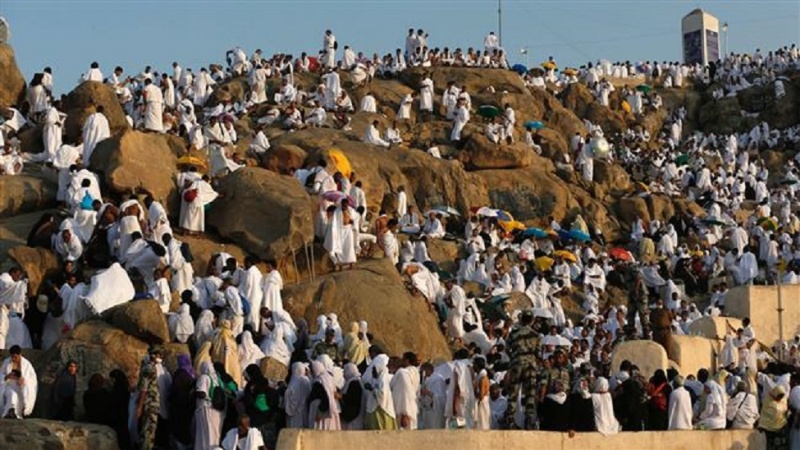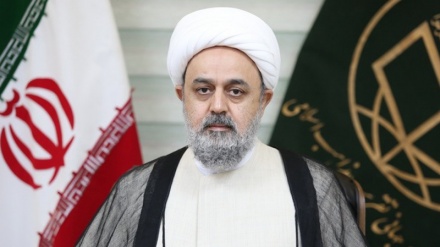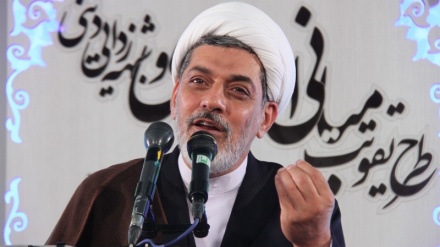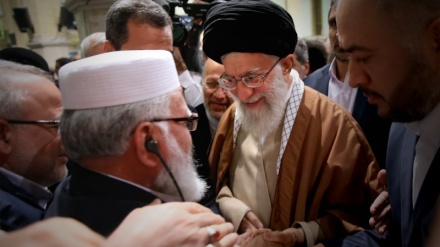Significance of the Day of Arafah
Welcome to a special programme on the occasion of the Glorious 9th of Zi’l-Hijjah, the Blessed Day of Arafah when Hajj pilgrims assemble on the plain of the same name, southeast of the holy city of Mecca, to observe special rituals of this day on which we ought to instill in ourselves the proper cognizance of God Almighty, as the Prophets had done.
This year the Iranian pilgrims are back again in Mecca for the Hajj after being denied visa last year by the Saudi regime, following its massive mismanagement of the Hajj in 2015 which resulted in a tragic stampede that left over seven thousand guests of God dead on the sacred plain of Mena on 10th Zi’l-Hijja, including some five hundred Iranian men and women.
We hope this year’s Hajj will pass peacefully and the day will soon come for end of the Wahhabi occupation of the Land of Divine Revelation which the brigand from Najd, Abdul-Aziz Aal-e Saud, had seized in 1925 at the behest of Britain by shedding the blood of tens of thousands of Muslims in the holy cities of Mecca and Medina. For his crimes against humanity, London had created for him the spurious entity called Saudi Arabia in 1932.
Stay tuned please for a special feature on the significance of Arafah on which God Almighty accepts the supplications of the faithful, and as is evident by the string of victories of the Islamic resistance in Lebanon, Iraq, and Syria against the Godless Takfiri terrorists, will surely cleanse the Land of Revelation of the filth of the Wahhabis, Amen.
Arafah is the day on which God the All-Merciful had accepted the repentance of the Father of the human race, Adam, after his expulsion from the Garden of Eden and separation from his wife, Eve, for having eaten the fruit that had been forbidden to them as a divine test.
Arafah is also the day which Prophet Abraham, on God’s commandment, institutionalized it as part of the Hajj rituals, while achieving the complete cognizance of the One and Only Creator to whom he had been obedient since childhood, by passing all divine tests, including his unscathed emergence from the huge fire into which he was flung by the tyrant Nimrod; his subsequent expulsion from his homeland Mesopotamia; his settling in Canaan or modern Palestine; his leaving of his second wife Hajar and his firstborn child, Ishmael, in the wilderness of Mecca; and last but not the least, his sacrifice of the youth Ishmael which was miraculously substituted with a ram sent from heaven by the Almighty.
Arafah is also the day on which the Almighty’s Last and Greatest Messenger, Prophet Mohammad (SAWA) during his Farewell Hajj Pilgrimage, delivered a memorable sermon from atop Jabal ar-Rahma or Mount Mercy, emphasizing the equality of all mankind, irrespective of the superficial differences of ethnicity, languages spoken, colour of skin, and place of birth. He then stressed that in the sight of God faith and piety are important, and thus in order to guide believers towards the shores of salvation he exhorted Muslims to hold fast to the Thaqalayn or the two weighty things, with the words:
“I am leaving behind amongst you the Thaqalayn, the Book of God (the holy Qur’an) and my progeny the Ahl al-Bayt. Hold fast to them and you will never go astray for the two never separate with each other even when they meet me at the Fountain (of Kowthar on Resurrection Day).”
The Prophet of Islam did not leave Muslims in the dark and specified by name his divinely-designated successors, of whom the first was his cousin and son-in-law, Imam Ali ibn Abi Taleb (AS), who was proclaimed by him on God’s express orders at Ghadir-Khom, exactly nine days after Arafah, with those immortal words: “For whomsoever I am Master, this Ali is his Master.”
It should be noted that a few years before his Farewell Hajj Pilgrimage the Prophet had sent Imam Ali to Mecca to proclaim God’s command concerning the correct performance of the Hajj rituals and practically teach it to the people, on revelation of the first few ayahs of Surah Towbah, including the fundamental principle of “bara’at min al-mushrikin” or disavowal of disbelievers, as is evident by ayah 3 of the same Surah, which reads:
“[This is] an announcement from Allah and His Prophet to all the people on the day of the Greater Hajj: that Allah and His Prophet repudiate the polytheists.” (Holy Qur’an 9:3)
As is clear the repudiation of the polytheists or disavowal of disbelievers (bar’aat min-al-mushrikeen) is a commandment of God Almighty and His Last and Greatest Messenger, Prophet Muhammad (SAWA), to be observed during the Hajj.
Alas, after the Prophet’s departure from the world, when the political power of the Islamic state was usurped by former idolaters and after them by the second, third and subsequent generations of Arab Muslims, who were in fact the descendants of polytheists, pagans, atheists, idolaters, this divine commandment was totally ignored. The Infallible Imams of the Ahl al-Bayt kept it alive, but after them the regimes ruling regimes in Hijaz, ignored it.
It was in 1980 that the Father of the Islamic Revolution, Imam Khomeini (RA), revived the fundamental principle of disavowal of disbelievers during the Hajj, with clear instructions to Iranian pilgrims to preach Islamic unity during the rituals, while proclaiming in an organized manner the repudiation of the polytheists, especially the present day archenemies of the Ummah (the US and the Zionist entity).
Unfortunately, the Saudi regime, which is in cohorts with the enemies of Islam, has suppressed such gatherings, massacring over 400 mostly Iranian pilgrims in the most inviolable place, Mecca, in 1987. Despite such pressures, the faithful have continued to hold such gatherings to express disavowal of disbelievers, even if it means doing it in a closed environment of the hotel or the encampment of the Iranian pilgrims in the plains of Arafat or Mena.
Since Arafah is the day for attaining the proper cognition of the One and Only Creator, as food for thought, the faithful, whether on the plain of Arafat for the Hajj pilgrims or in their own towns and cities, observe the rituals of the day of Arafah, especially recitation of the famous supplication of this day as taught by the Prophet’s grandson Imam Husain (AS), whose holy shrine in Karbala is the rendezvous every year on the 9th of Zi’l-Hijjah of devotees from all over the world.
Here is a passage from a supplication to God Almighty by the Survivor of the tragedy of Karbala, Imam Zain al-Abedin (AS):
“O Allah! This is the Day of Arafah, a Day which You have made noble, bestowed honour and magnified. Within it You have spread Your mercy, showed kindness through Your pardon, made plentiful Your grants, and by it You have been bounteous towards your servants.”
Arafah is also the day on which in the year 60 AH, Muslim ibn Aqeel, the emissary of Imam Husain (AS) to the people of Iraq, was tragically martyred in Kufa by Obeidollah ibn Ziyad the tyrannical governor of the accursed Yazid. The believers, wherever they are, hold mourning ceremonies for this martyr.
Here we cite some passages from the famous supplication of Imam Hussain (AS) for this day:
“You are verily Originator and Reproducer (of the creation) and worthy of all praise and full of all glory. Holy be Your Names as Your bounties are so immeasurable. Which of Your favors, O my God, can I count in numbers and examples? Or which of Your gifts can I thank properly?
“They are, O my Lord, too numerous to be counted by counters or to be realized by memorizers. Moreover, that which You have warded off and repelled,
“O Allah, from (the various kinds of) harm and mischief is more than that which came to me from wellbeing and joy. And I bear witness, O my God, with my true belief, and the fortitude of the determinations of my conviction and the purity of my open belief in Your Oneness and the essence of the secret of my conscience, and the ties of the canals of the light of my sight, and the lines of my forehead and the hallows of the courses of my breath, and the (nasal) cavities of my nose, and the courses of the meatus of my hearing, and whatever my two lips hide and cover up, and the motions of the vocalization of my tongue, and the socket of the palate of my mouth and jaw, and the matrices of my dents, and the tasting of my food and my drink, and the carrier of my skill, and the tube of the tissues of my neck and what is included by the cloak of my chest, and the carriers of the cord of my aorta, and the cords of the pericardium of my heart, and the pieces of the retinues of my liver, and that which is included by the cartilages of my ribs, and the cavities of my joints, and the interacting of my organisms, and the extremes of my fingertips, and my flesh, and my blood, and my hair, and my skin, and my nerve, and my sinews, and my bones, and my brain, and my veins, and all of my organs, and that which was pieced together during the days of my suckling, and whatever of my body that the ground carries, and my sleeping, and my wakefulness, and my motionlessness, and the movements of my bowing and prostration; (by all that I bear witness) that if I try my best and strive throughout all ages and all times, if I live them, to thank properly only one of Your favors, I will not be able to do that, except through a favor of You, which also requires me to thank You for it, once again with new thanking and with praise that is newly acquired and newly prepared.”
AS/MG



